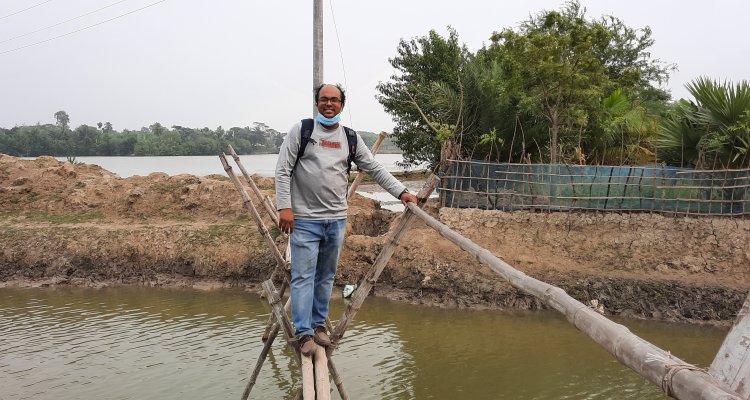
Alumnus testimonial
Masud - PhD Water System and Global Change
Masud finished his Master's in Environmental Sciences. After this, he always wanted to return to Wageningen University & Research and got the chance when he got a Fellowship from Bangladesh Government. He is now doing his PhD at the Water System and Global Change group at WUR.
In my master's, I have enjoyed so many things, for instance, quality education, friendly and international environment, beautiful campus and city, cycling and so on.
Could you please tell us a bit about yourself?
I am Masud from Bangladesh and I completed my MSc in Environmental Science as a Nuffic Fellow. Currently, I am doing my PhD at the Water System and Global Change group at WUR. This was made possible with the Prime Minister Fellowship, a prestigious fellowship by the Bangladesh Government. I am also affiliated with Khulna University, Bangladesh as a Faculty Member in the Environmental Science discipline. Earlier, I have completed my BSc and MSc from the same institution. In the future, I want to contribute to science as an academician.
How did you arrange your master's studies to fit your interests?
In my master's, I choose Environmental System Analysis and learned how to analyse an environmental problem from different perspectives. I did my major thesis in the ecosystem services assessment domain and worked in my countries mangrove, the Sundarbans which is the largest single tract mangrove in the world.
I found this topic very interesting and important from my countries perspective as we often ignore the importance of nature while concentrating on tangible value. Moreover, I took several courses from the environmental policy group as well, because of my interest to work on the response of environmental management.
In my master's, I have enjoyed so many things, for instance, quality education, friendly and international environment, beautiful campus and city, cycling and so on. However, an interdisciplinary approach to deal with an environmental problem and interactive teacher-student learning process was the finest experience.
What is your current job?
I am now doing my PhD at the Water System and Global Change group. I was always passionate to return to WUR for my PhD and fortunately, it came into reality when I have been awarded the prestigious Prime Minister Fellowship from Bangladesh Government.
In my PhD, I am working on “Environmental Sustainability of the Bangladeshi Shrimp Industry in the context of Climate Change”, where I am working on how our shrimp industry can be sustainable and climate adaptive. Professionally, in my country, I am affiliated as a Faculty Member in the Environmental Science Discipline of Khulna University, which is a pioneer in environmental science education in Bangladesh. I hope, I will finish my PhD in due time and will return to my responsibility with advanced knowledge and experiences.
Is this what you always wanted to be or what has changed?
I am fortunate enough that this is exactly what I am always want to do. First, I am always motivated to work on a real environmental problem in Bangladesh, which is closely related to the climate-vulnerable livelihood of the local people. Second, after my MSc at WUR, I always dreamt to come back here. I do believe, even after my PhD, I will able to continue my research work with similar problems and the present linkage would be helpful for me to make collaboration in research.
How do you contribute to a better world and what role did studying in Wageningen have to achieve this?
I am studying here at WUR because my Government allows me (study leave) to come here to make myself more compatible with research and education. Here, I learned how to frame the complex environmental problem in a systematic approach and the importance of interdisciplinarity.
I do believe, when I will return to my place, I would be able to use and share this advanced knowledge with my students and contribute to their research to find a sustainable response. Bangladesh has achieved tremendous economic development in the last few decades but environmental sustainability is an area where we need to focus, exactly the area where I want to contribute in the future.
What choices have you made that have helped you to get where you are now?
A couple of things attract me to come back here to WUR. The first one is the quality of education, especially the learning process. The second one is the living environment of Wageningen. The beautiful and calm environment of Wageningen and friendly people and their behaviour towards international students is commendable. However, the thing I missed most when I went back to my country is cycling. Besides, working in the Lumen building is certainly another fortune.
How did studying in Wageningen helped you overcome the challenges that you have encountered in your previous and/or current job?
As a faculty member in a university, I love to work with young and energetic minds, who has the power to change the world and make it a better place. I want to help them with their research. I think the best thing I am going to bring for them from the WUR is the concern of sustainability in the research.
However, in the previous time, I found I was not up to the mark to encourage them to think about a problem and solution from a different perspective, sometimes in a bit unorthodox way. Now, I am quite confident that after my PhD, I will able to work with them in a systematic approach to think about a solution from a different perspective.